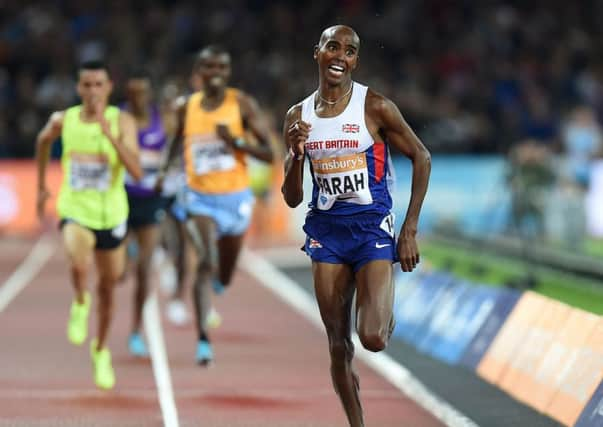Everyone needs to be confident our sport is clean and fair – Farah


Farah said: “I’m happy to do what it takes to prove I’m a clean athlete.”
The Sunday Times last week claimed it, along with the German broadcaster ARD/WDR, had had access to a database containing more than 12,000 blood tests from 5,000 athletes and revealed ‘’the extraordinary extent of cheating by athletes at the world’s most prestigious events’’.
Advertisement
Hide AdAdvertisement
Hide AdAthletes were last week warned against publishing their test results.
British Athletics feared releasing selective data could be “misinterpreted” and may also imply those not publishing their data were “guilty by omission”, while The Sunday Times said lawyers for the IAAF had written to the newspaper suggesting athletes were not aware of the implications of putting the data in the public domain.
But Farah, whose coach Alberto Salazar has denied doping allegations broadcast in a BBC Panorama programme in June, leads eight top British athletes in defying athletics authorities and permitting details of his anti-doping blood test data to be made public.
The Sunday Times reports that 20 blood test results from Farah held on the IAAF’s database – covering from June 2005 to May 2012 – are within the normal range.
Advertisement
Hide AdAdvertisement
Hide Ad“The decision to release my results is a personal one,” the 32-year-old said in the newspaper. “I’ve always said that I’m happy to do what it takes to prove I’m a clean athlete.”
Farah added: “It’s sad that these allegations have been made at all because they bring down the sport I love, where most of the athletes don’t break the rules and work really hard to achieve what they do.
“As someone who is tested all the time, I understand that it’s a big job for the authorities to do but it’s an important one as everyone – including athletes – needs to be confident that our sport is clean and fair.
“It is good to see the organisations investigating and I hope they can quickly get to the bottom of it.”
Advertisement
Hide AdAdvertisement
Hide AdJoining Farah in calling for transparency and allowing their details to enter the public domain are fellow athletes Jo Pavey, Lisa Dobriskey, Jenny Meadows, Freya Murray, Hatti Archer, Emma Jackson and Andy Baddeley.
“When the public and fans watch us I want them to believe in what they see.
“Publishing my data is the only thing I have available to me personally that is within my power to help fight for clean sport,” Olympic 1,500m finalist Baddeley said.
Meadows, an 800m specialist, added: “Hopefully this disclosure will help protect athletes like myself from missing out on medals and positions in finals in the future and give future generations hope and confidence that the IAAF will ensure that doping has no place in our sport.”
Advertisement
Hide AdAdvertisement
Hide AdARD/WDR and The Sunday Times gained access to a database containing more than 12,000 blood tests from 5,000 athletes and claimed more than 800 athletes – and a third of all medallists in endurance events at recent Olympics and World Championships – had suspicious blood test results which were not followed up by the IAAF.
British Athletics chairman Ed Warner responded earlier this week to talk of British athletes allowing their data to be published, saying: “We believe that selective publication in this way could be misinterpreted.
“Also, it might mean that any athlete not publishing their data is somehow guilty by omission.
“We believe it is incumbent on the IAAF to demonstrate that all untoward blood test results from athletes of any nationality have been thoroughly investigated and all appropriate action taken.
Advertisement
Hide AdAdvertisement
Hide Ad“We’d encourage British athletes to call for this demonstration of the integrity of the IAAF’s systems, rather than opening up their personal medical data to the public with the attendant risks that this might create.”
Further claims in The Sunday Times yesterday said seven London Marathon winners in a 12-year period recorded suspicious blood scores, while the winners of 34 major marathons around the world – one in four – from 2001 to 2012 should have faced censure or investigation because of their test results.